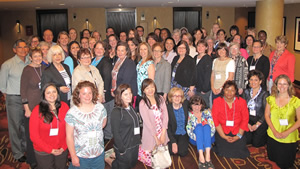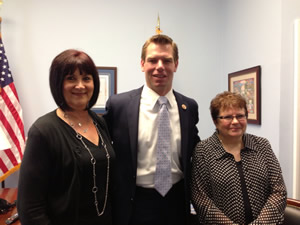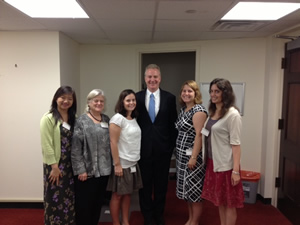|

On 16–18 June, 2013 more than 50 members of TESOL International Association assembled in Washington, DC for the 2013 TESOL Advocacy & Policy Summit (formerly TESOL Advocacy Day). Now in its 8th year, this unique program featured a full a day of issue briefings and activities centered around education legislation and advocacy, followed by a day of visits to Congressional offices on Capitol Hill. By the end of the event, TESOL members—including representatives from more than 20 U.S. affiliates—had visited the offices of approximately 100 representatives and Senators.
Contrasting with advocacy programs of the past that typically focused on a single piece of legislation, the new format of the TESOL Advocacy & Policy Summit had a broader policy agenda. The program of the Summit was essentially divided into two parts: policy and advocacy. The goal was to not only learn more about federal policy issues impacting ESL and ELLs, but to provide an interactive learning experience on elements of advocacy.

TESOL members with CA Representative Eric Swalwell
To fully prepare for the Summit, participants were required to prepare in advance. For example, participants had to set up their own individual meetings with their Congressional representatives. To assist with this, TESOL International Association provided directions and guidance, as well as the list of specific representatives and senators to contact. Participants were also sent talking points and background information on key issues so that they could begin to familiarize themselves with the issues in advance. To help make their Congressional meetings more effective, participants were also encouraged to find examples from their own programs to illustrate the talking points.
For the policy portion of the Summit, participants were provided an overview of legislative issues, followed with briefings from experts on key issues and policies. Adam Fernandez, Legislative Associate with the Mexican American Legal Defense and Education Fund (MALDEF) and cochair of the Hispanic Education Coalition (HEC), led a discussion on some of the issues in immigration reform and in reauthorization of the Elementary and Secondary Education Act (ESEA) impacting ELLs. This was followed by a panel featuring Joanne Urrutia from the Office of English Language Acquisition (OELA) and Supreet Anand of the Title III Group at the U.S. Department of Education, who copresented on the activities of their offices. To close out the policy portion, Debra Suarez from the Office of Vocational and Adult Education (OVAE) at the U.S. Department of Education provided an update on new initiatives for adult ESL and adult education.
Following these briefings, the Summit shifted its focus to advocacy with a series of activities to help participants learn more about the advocacy process and prepare for their meetings with members of Congress. Participants had a chance to meet in small groups to discuss various issues they faced locally, and to share tips for and ideas about meeting with legislators. To help prepare for their meetings, participants attending from the same state were teamed up so they could meet with the legislators in small groups.

TESOL members with MD Representative Chris Van Hollen
“It was an awesome experience!” shared Margie Wilson, a first-time attendee from TexTESOL V. “I learned the value of acting as a team with other affiliates across my state. It was very rewarding. I plan to become more active in TESOL International Association as a result.”
On 18 June, participants went to Capitol Hill to have meetings with members of Congress and staff. While many had two or three meetings scheduled, some had as many as five or more throughout the day. Participants spent the day in and around the U.S. Capitol complex, meeting with legislators and their staff to discuss the issues the participants face as ESL educators. Most focused on the impact of sequestration, while some addressed related issues in their district.
Bette Empol, a first-time attendee representing California TESOL, really enjoyed the experience of going to Capitol Hill. “It was great to have the experience of going into the Congressional office buildings to meet with legislators and their staffs. I learned that the legislative staffers do listen and are very attentive, and saw the importance of reaching out to them—it definitely makes an impact.”
At the end of the day, the participants reassembled to share their experiences and debrief. It was interesting to hear what other people experienced on their visit. Some discussed individual meeting experiences and information they had learned from Congressional staff about pending legislation, while others talked about their own experiences on Capitol Hill. Overall, all of the participants agreed this event was a very positive experience for them and for TESOL International Association.
Lori Dodson, who returned for her second time representing Washington Area TESOL (WATESOL), agreed. “I really enjoy the Advocacy & Policy Summit! It was empowering to be part of the political process and to meet other educators from around the country who want to collaborate on the same issues.”
Additional information about the 2013 TESOL Advocacy & Policy Summit will be available soon online at www.tesol.org. If you are interested in learning more about your Congressional representatives current legislative issues, go the TESOL U.S. Advocacy Action Center at http://capwiz.com/tesol. |